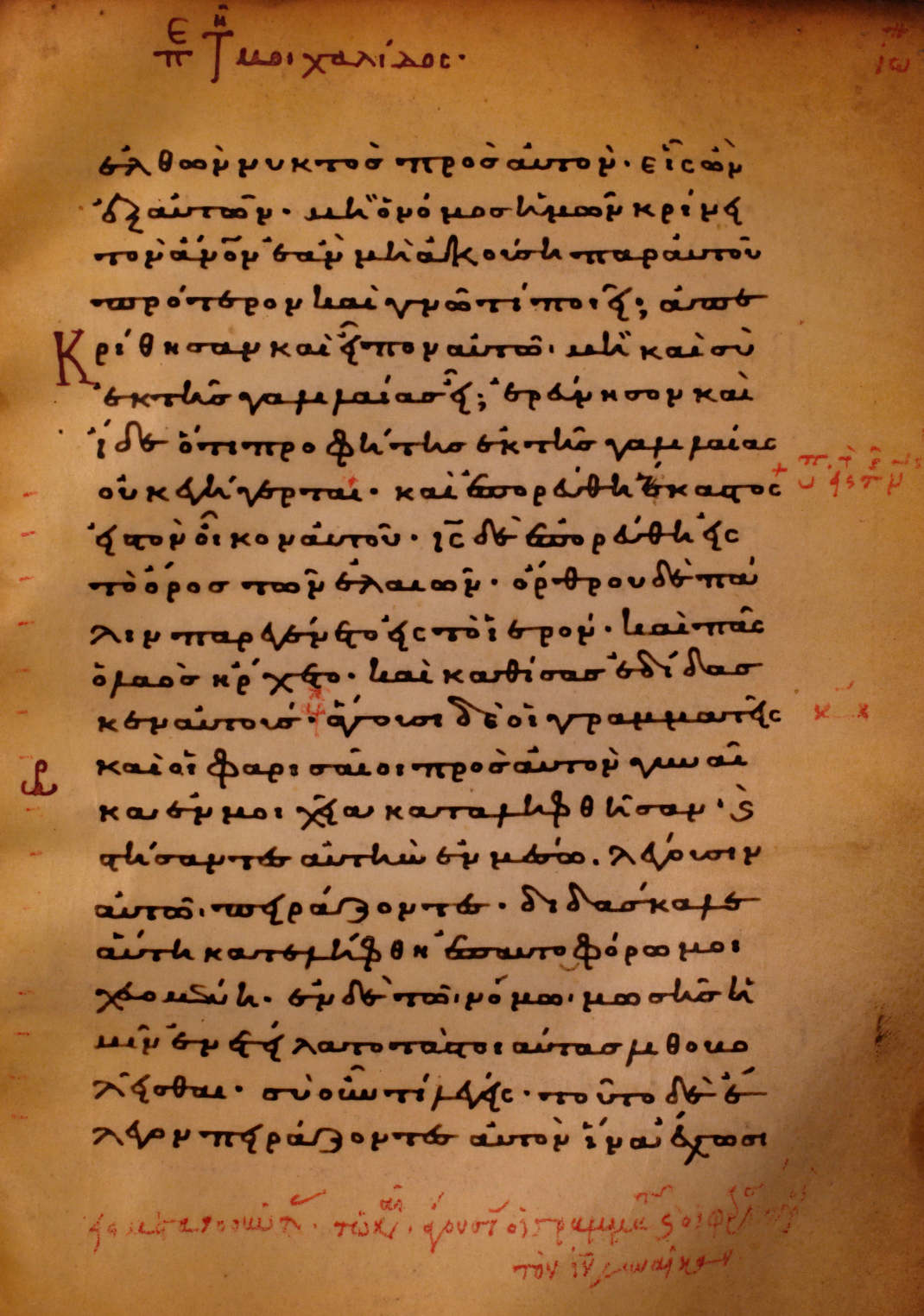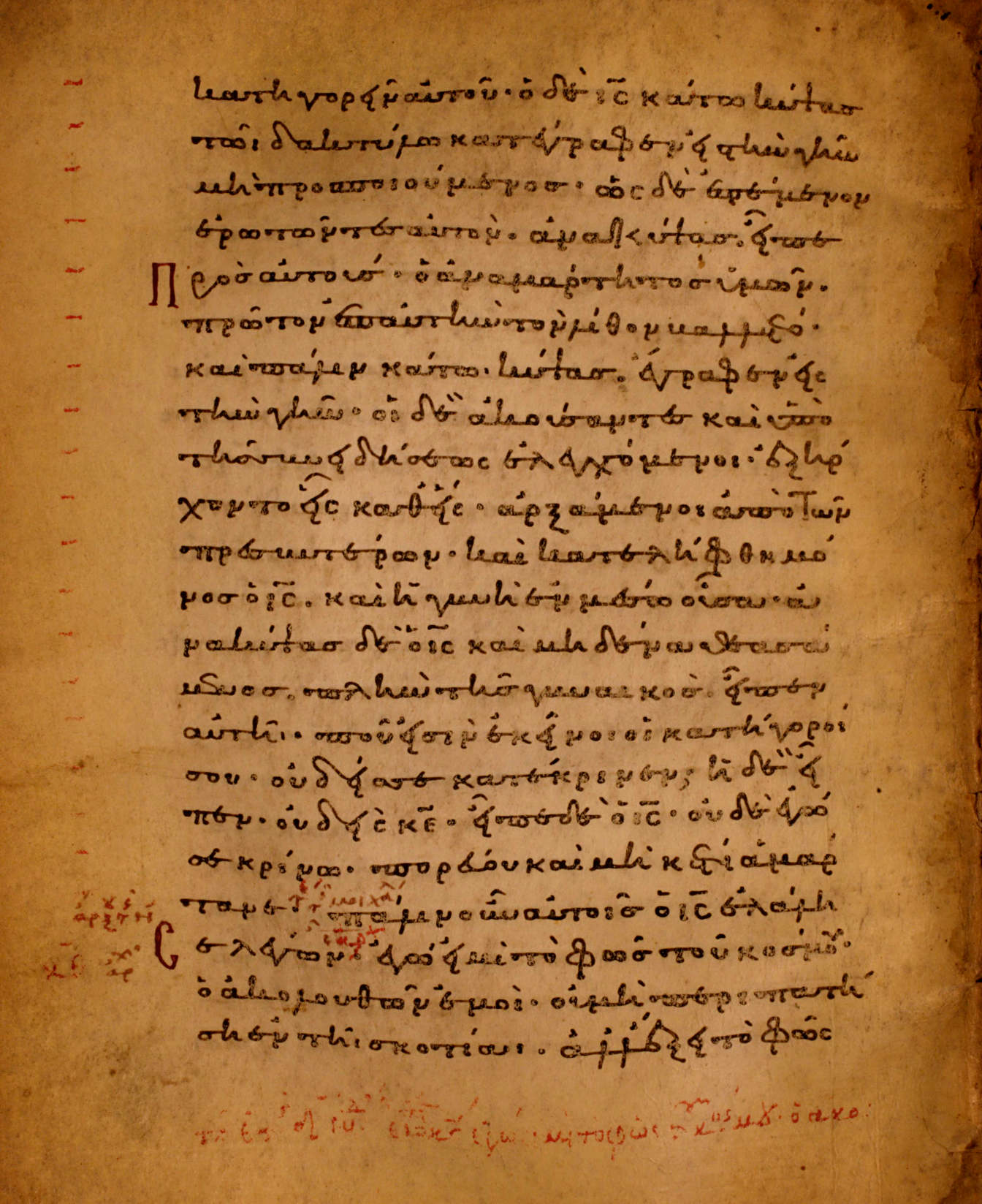Last Updated:
Mar 10, 2010
Excerpt from: Miniscule #532, (11th cent.)
Review: - Miniscule GA-532:
Photos - and brief notes
Transcription - with xlation
11th century Miniscule
(11th century)
John 7:50b-8:6a
Jn 7:52 ends half-way across line 8, followed immediately by an enlarged dot & space. v.7:53 then begins, and continues normally with 7:53-8:11 inclusive, containing the Pericope Adulterae (PA) without any break or note of suspicion from the original copyist's hand. This conforms to the standard pattern for the majority of the some 2,400 surviving continuous-text manuscripts for John in Greek.
The heading at the top of page, "moixalidos" (Adultery) appears to have been added at the same time as the decorative Large letters in the Left margin denoting paragraphs, in the same purple ink, probably at the scriptorium.
A much later unknown hand has marked the PA with strokes of red ink down the left margin and added footnotes to both pages. The original scribe had no awareness of this, and these secondary marks have no significance or value in determining the text of his master-copy.

John 8:6b-8:12a

(11th century)
This copyist gives an excellent and neat "cursive" bookhand, which makes for a great opportunity to practise our reading skills for the unusual ligatures and special forms found in later miniscule writing. We therefore offer the transcription in an unusual format, five lines at a time, along with photo and translation:
| Line | Greek | English | |
|---|---|---|---|
| 1 2 3 4 5 |  | ||
| 50b...ἐλθὼν νυκτὸς πρὸς αὐτόν, εἷς ὢν ἐξ αὐτῶν - 51 Μὴ ὁ νόμος ἡμῶν κρίνει τὸν ἄνθρωπον, ἐὰν μὴ ἀκούσῃ παρ' αὐτοῦ πρότερον καὶ γνῷ τί ποιεῖ; 52 Ἀπε κρίθησαν καὶ εἶπον αὐτῷ, Μὴ καὶ σὺ | who came to Jesus by night, being one of them) said to them, "Does our law judge a man before it hears him and knows what he is doing?" They answered and said to him, "Are you also | ||
| 6 7 8 9 10 |  | ||
| ἐκ τῆς Γαλιλαίας εἶ; Ἐρεύνησον καὶ ἴδε ὅτι προφήτης ἐκ τῆς Γαλιλαίας οὐκ ἐγηγέρται. 53 Καὶ ἐπορεύθη ἕκαστος εἰς τὸν οἶκον αὐτοῦ: 1 ἸΣ δὲ ἐπορεύθη εἰς τὸ ὄρος τῶν Ἐλαιῶν. 2¶ Ὄρθρου δὲ πά- | from Galilee? Search and look, for no prophet has arisen out of Galilee." And everyone went to his [own] house.But Jesus went to the Mount of Olives. Now at dawn again | ||
| 11 12 13 14 15 |  | ||
|
-λιν παρεγένετο εἰς τὸ ἱερόν, καὶ πᾶς ὁ λαὸς ἤρχετο: καὶ καθίσας ἐδίδασ- -κεν αὐτούς. 3 Ἄγουσιν δὲ οἱ γραμματεῖς καὶ οἱ Φαρισαῖοι πρὸς αὐτὸν γυναῖ- -κα ἐν μοιχείᾳ καταλήφθεισαν: καὶ | He came into the temple, and all the people came; and He sat down, taught them. Then the scribes and Pharisees brought to Him a woman caught in adultery. And | ||
| 16 17 18 19 20 |  | ||
|
στήσαντες αὐτὴν ἐν μέσῳ, 4 λέγουσιν αὐτῷ, πειράζοντες, Διδάσκαλε, αὕτη κατελήφθη ἐπ' αὐτοφόρῳ μοι- -χευομένη. 5 Ἐν δὲ τῷ νόμῳ [Μωσῆς] ἡ- -μῖν ἐνετείλατο τὰς τοιαύτας λιθοβο- | when they had set her in the midst,they said to Him, tempting Him, "Teacher, this one was caught in the act of adultery; In the law Moses commanded to us that such should be stoned. | ||
| 21 22 |  | ||
|
-λεῖσθαι: σὺ οὖν τί λέγεις; 6 Τοῦτο δὲ ἔ- -λεγον πειράζοντες αὐτόν, ἵνα ἔχωσιν | But what do You say?" This they said, testing Him, that they might have | ||
| 1 2 3 4 5 |  | ||
|
κατηγορεῖν αὐτοῦ. Ὁ δὲ ἸΣ κάτω κύψας, τῷ δακτύλῳ [ἔγραφεν] εἰς τὴν γῆν, μὴ προσποιούμενος. 7 Ὡς δὲ ἐπέμενον ἐρωτῶντες αὐτόν, ἀνακύψας εἶπεν πρὸς αὐτούς, Ὁ ἀναμάρτητος ὑμῶν, | to accuse Him. But Jesus stooped down, wrote on the ground with a finger, as though He did not hear. As they continued asking Him, He raised Himself up, said to them, "The sinless among you, | ||
| 6 7 8 9 10 |  | ||
|
[πρῶτον] ἐπ' αὐτὴν [τὸν] λίθον [βαλέτω.] 8 Καὶ πάλιν κάτω κύψας ἔγραφεν εἰς τὴν γῆν. 9 Οἱ δέ, ἀκούσαντες, καὶ ὑπὸ τῆς συνειδήσεως ἐλεγχόμενοι, ἐξήρ- -χοντο εἷς καθ' εἷς, ἀρξάμενοι ἀπὸ τῶν | let him throw a stone at her first." And again He stooped down and wrote on the ground. But those hearing, and convicted by conscience, went out one by one, beginning with the | ||
| 11 12 13 14 15 |  | ||
|
πρεσβυτέρων: καὶ κατελείφθη μό- -νος ὁ ἸΣ, καὶ ἡ γυνὴ ἐν μέσῳ οὖσα. 10 Ἀ- -νακύψας δὲ ὁ Ἰησοῦς, καὶ μηδένα θεασά- -μενος πλὴν τὴς γυναικός, εἶπεν αὐτῇ, Ποῦ εἰσιν ἐκεῖνοι οἱ κατήγοροί | oldest. And Jesus was left alone, and the woman standing in the midst. When Jesus had raised Himself up and saw no one but the woman, He said to her, "Where are those accusers | ||
| 16 17 18 19 20 |  | ||
|
σου; Οὐδείς σε κατέκρινεν; 11 Ἡ δὲ εἶ- -πεν, Οὐδείς, ΚΕ. Εἶπεν δὲ ὁ ἸΣ, Οὐδὲ ἐγώ σε κρίνω: πορεύου καὶ μηκέτι ἁμάρ- -τανε. 12 ¶ Πάλιν οὖν αὐτοῖς ὁ ἸΣ ἐλάλη- -σεν λέγων, Ἐγώ εἰμι τὸ φῶς τοῦ κόσμου: | of yours? [fn] Has no one condemned you?" She said, "No one, Lord." And Jesus said to her, "Neither do I condemn you; go and sin no more." Then Jesus spoke to them again, saying, "I am the light of the world. | ||
| 21 22 |  | ||
|
ὁ ἀκολουθῶν ἐμοὶ οὐ μὴ περιπατή- -σῃ ἐν τῇ σκοτίᾳ, ἀλλ' ἕξει τὸ φῶς... | He who follows Me shall not walk in darkness, but have the light... [of life.]" | ||
